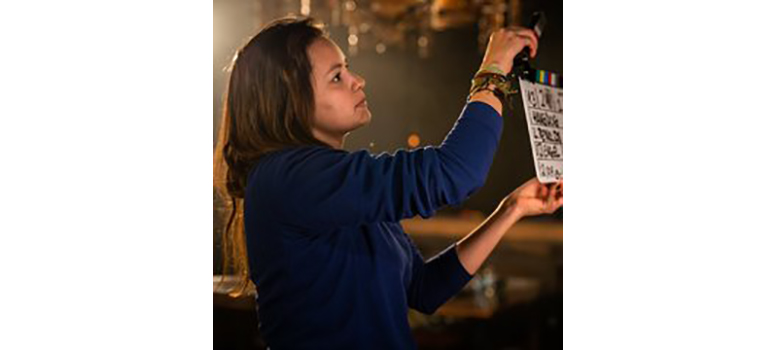By Jeremy Appel, Local Journalism Initiative Reporter
The ImagiNATIVE initiative is giving young Indigenous filmmakers the resources to bring their projects to fruition.
The ImagiNATIVE initiative, which is a partnership with Netflix, provides professional development support for Indigenous filmmakers in Canada through a series of labs and mentorships focused on various aspects of filmmaking.
Kristina Firther-Stiele, a member of the Teslin Tlingit band in Yukon, began her filmmaking journey in the creative writing program at the University of Victoria.
After the four year program, she was unsure what she wanted to do with her degree, and was working odd jobs to get by. A friend suggested they apply for film school.
Firther-Stiele went to film school at the Southern Alberta Institute of Technology in Calgary, where she resides.
“It was a really nice marriage between my love of film and my love of writing. I got to flex my writing skills, as well as my storytelling skills and also learn technical stuff, which I did not know,” she told Alberta Native News of her time in film school at SAIT.
The creative component was no problem for her, given her experience in creative writing, but she had to pick up the more technical aspects of camera work and sound engineering.
She began work on her short film, a horror anthology film called The Woods, which was commissioned by ImagiNATIVE and screened at its Toronto film festival.
Through ImagiNATIVE’s screenwriting series lab, Firther-Stiele was able to turn that film into an anthology series, with each episode a different horror story.
She was set up with a mentor who had experience in TV production to help her develop a pilot and the program helped her arrange meetings with potential agents to help pitch her series.
Firther-Stiele is now in the process of rewriting the pilot and getting ready to shop it around.
“I didn’t know going into the series lab what the end product would be. I don’t think anyone did. Everyone’s kind of figuring it out,” she said. “But it was really cool to go through the whole process and learn so much more, because I only really worked in short films and on film sets, so learning the TV series side of it was really different.”
She said horror is the ideal genre for exploring issues related to indigeneity, as well as the struggles of other persecuted groups.
“Horror is a great way to talk about really serious subject matter, but in a safe space because you can walk away from that. But it’s still part of the reality, so it starts more conversations,” Further-Stiele said. “It can also be really cathartic.”
She’s in the process of working on another short film that’s more of a horror comedy focused on women’s reproductive and LGBTQ rights.
Bruce Miller, who’s from the Matachewan First Nation In Ontario, participated in ImagiNATIVE’s original commissions mentorship program.
The ImagiNATIVE project helped him shoot his short film, Conviction, which was based on a short story he wrote earlier in his career. The film screened at the 2022 Whistler Film Festival.
He wrote and directed that film, which he’s in the process of adapting into a feature-length film, thanks to grant funding.
Miller has always had a creative side and has been captivated by film since childhood. He initially went to art school to explore his creativity, studying theatre at Cambrian College before attending Vancouver Film School.
Taking a 15-year break from his creative pursuits, he moved to Calgary and became a social worker.
Miller said when he first started out it was tough for Indigenous filmmakers to get their voices heard in the industry, which is why he switched careers, but “now there’s tons of support.”
Filmmaking has been a valuable outlet “to heal from” the trauma of being a social worker, but Miller also sees it as a way to “bring community together” through a shared narrative.
Racism has, of course, held many emerging Indigenous artists back from fully expressing themselves, but Miller said that’s changing. “Indigenous people in our community have many, many great stories and many, many great people to contribute to the arts,” he said.
While social work and filmmaking are vastly different fields, he said filmmaking allows him to explore issues he dealt with as a social worker by other means, such as mental health and addiction.
“When I do my films, I sort of want my success to be other people’s success too,” Miller said.



Be the first to comment on "ImagiNATIVE program helps Indigenous filmmakers develop their visions"